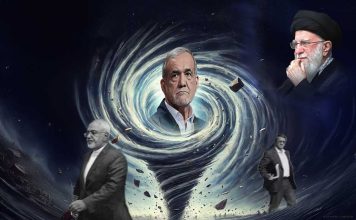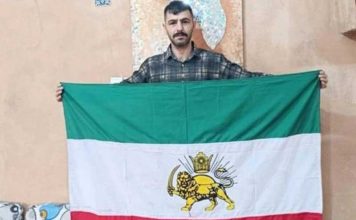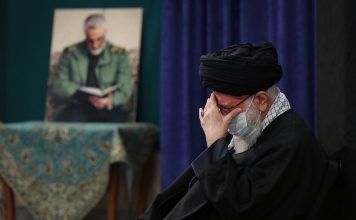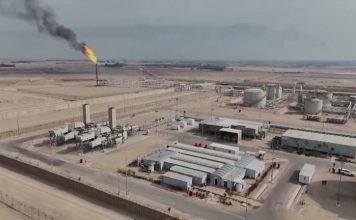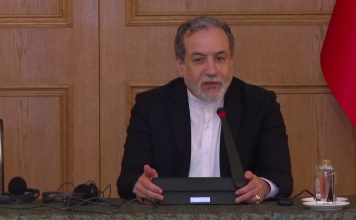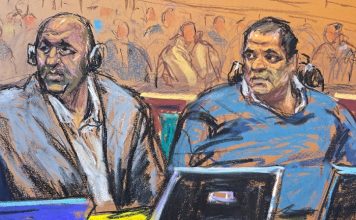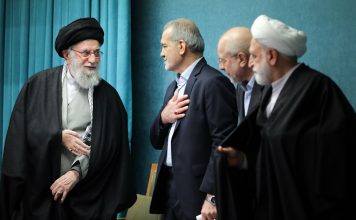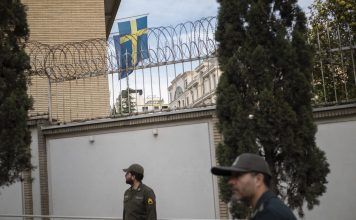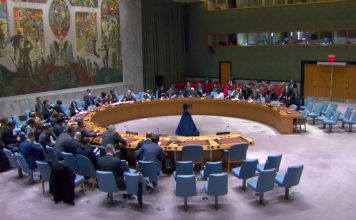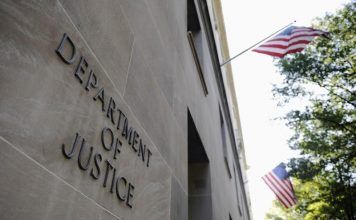The Ni’matullahi lineage of Sultan Ali Shahi Gonabadi is one of the most well-known mystical orders in Iran, dating back to around the 14th century AD. The Gonabadi dervishes follow the school of Sufism and Islamic mysticism, acting according to the Quran with a wise understanding of it. They refer to their place of worship as “Hosseiniyeh.”
Since the 1979 revolution, the ruling system in Iran has discriminated, suppressed and cracked down against the Gonabadi dervishes. In 1980, the Amir Soleimani Hosseiniyeh, located in Sangalaj, Tehran, was set on fire by pressure groups from the government. Saeed Emami, the operational head of the team that led the “chain murders” of political adversaries in Iran, announced in a speech in Hamedan that “the dervishes are one of the four dangerous groups for the system. ”Shortly after this speech, Haj Ali Tabandeh, the Qutb (leader) of the dervishes, died of a heart attack at the age of 51 in January 1997, coinciding with the “chain murders.” In the 2000s, Hosseiniyehs and Gonabadi dervish religious sites were destroyed in several cities in Iran, including Qom, Borujerd, and Isfahan.
The crackdown against the Gonabadi dervishes blew up on February 3, 2018, and continued with their siege in front of the home of their Qutb, Dr. Tabandeh, in Golestan 7th Street in Tehran. Hundreds of dervishes were arrested and tried. In a report, the Hrana news agency reviewed the verdicts issued against Dervish and announced that the total was more than 1,000 years in prison and 6,000 lashes.
Dr. Seyyed Mostafa Azmayesh is Founder and Chairman of the International Organization to Preserve Human Rights, whose mission is campaigning for social reform and preservation of human rights. A French-Iranian jurist and scholar, Dr Azmayesh was tasked with “spreading true mysticism to the four corners of the world” on behalf of Dr. Nour Ali Tabandeh, the spiritual leader of the Gonabadi Dervishes, who passed away in 2019. In a wide-ranging interview with Kayhan Life, he evaluated the political situation in Iran, the “Women, Life, Freedom” movement, and the role of Crown Prince Reza Pahlavi. He also discussed the values and beliefs of the Gonabadi dervishes regarding secularism, democracy, nationalism, and Iranism. The interview is available on YouTube as separate videos.
[aesop_image img=”https://kayhanlife.com/wp-content/uploads/2023/10/Mostafa-Azmayesh.jpg” panorama=”off” credit=”Dr. Seyyed Mostafa Azmayesh. KL./” align=”center” lightbox=”on” captionsrc=”custom” captionposition=”left” revealfx=”off” overlay_revealfx=”off”]
Dr. Azmayesh, thank you for accepting our invitation to interview you in person. We have not seen you for nearly five years. You regularly spoke about the persecution of Dervishes and other religions in Iran at the United Nations and at the University of London. What was the reason for this absence?
The reason for my absence was the painful events that occurred in Iran regarding the Dervishes, which culminated in the tragic incident of the 7th Golestan Street and the unjustified imprisonment of Dr. Nour Ali Tabandeh, Majzoub Ali Shah, the Gutb (leader) of the Ni’matullahi Shiite dervishes of Iran. His imprisonment began in early February 2018 and ended with his martyrdom on December 24, 2019.
After that, many efforts were made against the spiritual heritage of Dr. Nour Ali Tabandeh. The aim of these efforts was to distort history, cover up the facts, and replace reality with fiction and fantasy. All my focus and attention was devoted to a mission that Dr. Nour Ali Tabandeh had entrusted to me many times in writing and verbally: to present true mysticism to the world. For this reason, I wasa mentally preoccupied. When the Mahsa (Jina) Amini movement, the “Women, Life, Freedom” movement came into being, and the people of Iran came together and announced the rejection of the ruling system, I decided to come back.
What is your assessment of the current political situation in Iran?
The people of Iran rose up with the “Women, Life, Freedom” revolution, and the flame that was ignited from Mahsa (Jina) Amini’s fire is still burning, illuminating the whole world. The people of Iran demand the realization of the rights of the oppressed generations of the past, and do not want future generations to suffer the same fate.
Although the ruling system in Iran claims to be Muslim, it is a feudal and authoritarian system, meaning that one person considers himself the overlord and all other people as his subjects, who should only be used as cannon fodder. But the people of Iran have very deep thoughts, wisdom, cultural beliefs, and deep-rooted worldviews, and they are not willing to be someone else’s cannon fodder – someone who wants to play the role of a lord and who claims: ‘I am the Supreme Leader with absolute power, and you are just ignorant people who must obey me.’ The people of Iran will not tolerate this situation.
Some sociologists maintain that today for the first time in the history of Iran, religion is not guiding the changes and developments that are taking place. What is your opinion on secularism?
The mystical worldview and the worldview of Dr. Tabandeh share common ground with secularism. He was never in favor of establishing a theocratic system. He was a defender of human rights and equality of the rights of men and women. He considered this as the basis of the Quranic perspective. He learned that the implication of Monotheism is the equality of human beings. Mysticism and religion are completely in line with secularism. Those who have used religion as a tool to establish a system of feudalism in the name of Islam and Islamic government in society are fraudulent, cheaters, and have betrayed history, humanity, and the Quran.
Today, Mawlana Abdolhamid (also known as Molavi AbdulHamid) expresses the same content every week in his Friday prayer sermons in Zahedan, Sistan-Baluchestan province in Iran. The common ground between Islam and democracy is human freedom, the right to determine one’s own fate, the right to vote, and gender equality. He did not learn these words from Montesquieu and Jean-Jacques Rousseau but through meditation on human rights in the Holy Qur’an.
The foundation of creating a utopian and healthy society, where people’s rights are equal and women are not subjected to double oppression, and ethnic and religious diversity does not lead to gender and racial apartheid, is based on secularism and democracy.
One of the debates currently being widely discussed among political activists concerns Iranian nationalism and territorial integrity? What are your views?
The love for Iran and patriotism flows in the blood of Iranians, and ideologies and export-oriented perspectives have not been able to extinguish the flame of nationalism in the hearts of Iranians. Mystics and scholars, especially the contemporary mystic of the last century, Dr. Tabandeh, emphasized the aspect of being Iranian. They did so, of course, not in the direction of chauvinism or racism, but in the direction of cultural Iran, which has roots for 7,000 years or more and has contributed greatly to the sphere of world culture. This view forms the basis of our mysticism. The views of the Zoroastrians in ancient texts indicate this. We deal with humans in Sufism and mysticism, but this human being has a geographical and cultural identity, which is why Iranian nationalism is of great importance to Dr. Tabandeh’s students.
It is clear that every inch of this land, which we call our homeland, is our motherland. It is a land where we were born and raised, and a common culture and history connect all tribes and inhabitants. Iran remains like a mosaic, with its pieces being a collection of different ethnic groups and ideologies that have a common history and are deeply connected by a very ancient cultural bond. Every inch of the soil of this sacred motherland is considered holy.
Crown Prince Reza Pahlavi is a prominent figure whose name is invoked in public arenas and international forums and called out even in football stadiums in Iran. How do you assess his role and position?
In a recent event that took place in the Isfahan football stadium between a team from Iran and a team from Saudi Arabia, 60,000 spectators who did not know each other gathered in one place. They were all young football enthusiasts, mostly unfamiliar with the Pahlavi dynasty. They did not plan anything in advance. When they violated the rules governing international football and placed a bust of Qassem Soleimani there, politicizing football, we saw that among these spectators, there was a spontaneous protest movement that became radicalized step by step. They chanted slogans like “We don’t want football with politics!” but they also said, “Rest in peace, Reza Shah!” and even more provocatively, “Where there is no king, there is no accountability!”
People may ask how those who chant slogans like “Rest in peace, Reza Shah!” or “Where there is no king, there is no accountability!” can have such nostalgia when they have no experience of the Pahlavi era and were born after the revolution. In 1971, the late Mr. Abdul Aziz Farmanfarmaian inaugurated the Aryamehr Stadium and Sports Complex. The Asian Games were held there in 1974 and various sports events were regularly held. Iran had even scheduled to host the 1984 Olympics and the 1990 World Cup. Contracts were signed at that time because this stadium symbolized competence in management. The management, planning, and foresight showcased during the 1974 Asian Games in various sports fields, especially football, were a source of pride and were recorded in Iran’s history. People are not unaware of these facts and have criteria for judgment.
The regime ruling Iran is forced to resort to terrorism and place banners and busts of terrorists in football stadiums due to its incompetence and unworthiness in governing the country. In this way, it seeks its own place, legitimacy, and sanctity through crisis-making and the creation of international crises, which it absolutely lacks.
When people look at history, they see that both Reza Shah and Mohammad Reza Shah were forced to leave Iran due to an international conspiracy, even though the Shah had undoubtedly initiated reforms. The Shah said, “People, I have heard the voice of your revolution, and I will fight against oppression and corruption alongside you.” He took steps on this path, and right from the moment he took this path, conspiracies began. For this reason, people today say that if those reforms had been implemented and managed by capable and deserving individuals, Iran would have reached remarkable heights.
It is evident that Mohammad Reza Shah completed his studies in Switzerland before ascending to the throne in 1941 and taking the oath of sovereignty. In other words, he was raised in a democratic society. His wife, Mrs. Farah Diba, received her education in France, a center of democracy, culture, and knowledge. Unfortunately, some individuals propagated a cult of personality through flattery and deceit, causing harm to Iranian society. When the Shah himself decided to introduce reforms, he took measures to arrest, imprison, and put on trial those responsible for promoting this cult of personality.
Therefore, when considering the role of the prince in the future, based on the slogans of the people, particularly the younger generation in Iran, it is crucial that past mistakes, including the cult of personality and the suppression of opposition, are not repeated.
Mr. Reza Pahlavi, due to his experience, is someone whose words clearly align with the principles of secularism and democracy, addressing the aspirations of the new generation in Iran. This generation has embraced universal values which a non-secular and non-democratic system can no longer accommodate. Therefore, the Prince plays a historical role in this transitional phase.
As recently demonstrated in London, we have witnessed ugly behaviour carried out by certain elements claiming to be defending Reza Pahlavi. Unfortunately, these actions resemble those of individuals who, during the reign of Mohammad Reza Shah, seemingly intended to show devotion to the Shah while betraying and undermining his position.
We should not allow the historical significance of Mr. Reza Pahlavi to be destroyed in the eyes of the younger generation, who express these slogans spontaneously and without any collusion or influence from external sources. We must be cautious not to repeat that experience. It is crucial to ensure that his historical position is not destroyed through false personality worship.
The energy and determination displayed in the ongoing movement and the slogans, recently echoed at Isfahan Stadium, demonstrate the people’s desire to continue their quest for reform from where it was halted; a pursuit akin to the reforms Mohammad Reza Shah had envisioned. Today, in Reza Pahlavi’s speeches, we witness the continuity of those same aspirations.
Since the Golestan 7th street incident in 2018, the situation of Sufis with the Iranian government has changed. What is the current situation for Sufis in Iran, and what is your position among them?
The system used many tricks to restrain Dr. Tabandeh, including issuing an arrest warrant against him. Eventually, the Golestan 7th incident occurred, leading to his house arrest. The system did not intend to put him under house arrest but rather issued an arrest warrant against him. However, the presence of a large group of Sufis serving him prevented them from doing so. Therefore, Dr. Nour Ali Tabandeh was placed under house arrest in his own home.
They did not allow anyone to visit him, and if anyone tried, the intelligence agency had placed guards in front of his house to prevent entry. He was completely imprisoned in his home for four months. In July 2018, when they reduced his house arrest and restrictions, they still did not allow anyone to film him. Phones were taken away so that no one could record his voice, and they did not even give him a microphone. They gave him sleeping pills so that when he spoke, he would suddenly fall asleep. Later, he said he that he felt he was being gradually poisoned because his health was deteriorating severely and rapidly. This house arrest was a gradual murder and a continuous crime that ended in his martyrdom.
Dr. Tabandeh had repeatedly stated that he would name his successor at the end of his life or when he was about to die. Coincidentally, a strange program was made about three weeks before he passed away as a martyr. They transferred him to the hospital, cut his throat, inserted a tube, and deprived him of the ability to speak. He was in this state for fifteen days and no longer had the possibility or will to express his opinion freely. He was in such a situation that he closed his eyes to the world.
At a time when dervishes are under pressure in Iran, what role can they play to help the Woman, Life, Freedom movement? And how can people help dervishes?
The dervishes in Iran are heavily monitored by security and intelligence agencies, especially those who were arrested during the Golestan 7th street incident and, prior to that, were imprisoned, tortured, lost their social position, and suffered a lot. They are still monitored by security agencies and do not have freedom of movement under the present circumstances.
The pressure on this dervish community is very high, but conditions are also changing. Consider the events that have happened in Sistan and Baluchestan in the past year, and every week a large number of people gather in Zahedan and other cities. In short, they recognize Mawlana Abdolhamid as their spiritual leader, or are willing to be seen with him in various cities in Kurdistan, in different cities in Golestan province, such as Turkman Sahra and other areas where they are constantly moving, and the government is unable to stop them.
It has been one year since the bloody gathering in Sistan, and they have arrested nearly 300 people, many of whom are under the legal age of 18. The demands of the people against the oppressive regime cannot be silenced by suppression and will continue with force.
Meanwhile, the dervishes who are outside the borders under the control of the security system of the ruling regime in Iran are working closely with international organizations such as Amnesty International, Human Rights Watch, and international assemblies in the European Union and the United Nations Human Rights Council. They are doing a lot of enlightening media activities, especially reporting and providing news. They do not allow the stifling of news or propaganda by the ruling regime in Iran to overshadow people’s minds. They are trying to remove the distortion of history, so that people know that our compatriots who lived in 1979 were not accomplices of Khomeini and this oppressive regime, but were victims of this reactionary regime change.
The Gonabadi Dervishes: Gnostics, Royal Advisors, Political and Religious Adversaries

